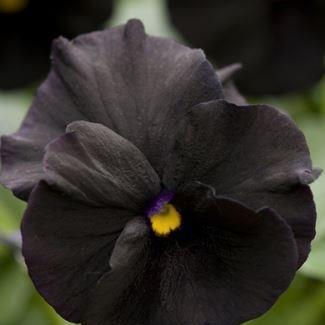
Viola cornuta 'Black Out'
Horned Pansy 'Black Out'
The open flowers consist of 5 petals which in the pansy types are rounded, and 4 of the petals face up, and one points downwards. (Violets have 3 pointing up, and two pointing downwards) ‘Blackout’,has deep black colored flowers, with a small yellow eye
Contributed by @sara2309
-
Full sun to partial shade
-
Occasional watering
-
Full Frost Hardy: 5F (-15°C)
-
Moist and fertile
Common name
Horned Pansy 'Black Out'
Latin name
Viola cornuta 'Black Out'
type
Herbaceous Perennials
family
Violaceae
ph
5.0 - 7.0 Acid - Neutral
Plant & bloom calendar
-
Best time to plant
-
When the plant will bloom
full grown dimensions
 0.30 M
0.20 M
0.30 M
0.20 M
Viola cornuta 'Black Out'
The open flowers consist of 5 petals which in the pansy types are rounded, and 4 of the petals face up, and one points downwards. (Violets have 3 pointing up, and two pointing downwards) ‘Blackout’,has deep black colored flowers, with a small yellow eye
Propagation by seed
From Mid Summer TO Late Summer
Sow seeds for V.tricolor and V. wittrockiana in mid to late Summer, either outdoors in a damp shaded site, or boxes placed in a cold frame. Transplant the seedlings into nursery beds, 4 inches apart until they are moved to a flowering site in Autumn. Seedlings sown in the cold frame should be potted up to 3 inch pots of John Innes No 1 and overwintered in the cold frame and moved to the flowering site in Spring
Summer or winter flowering
From Late Spring TO Early Spring
The summer flowering hybrids are in bloom from late Spring to early Autumn. Winter flowering varieties usually bloom from mid Winter to mid Spring, occasionally in the Autumn.
Planting Outdoors
From Early Autumn TO Late Spring
Plant violas in Autumn or Spring. Plant in any fertile, moist but well drained soil in sun or partial shade.















